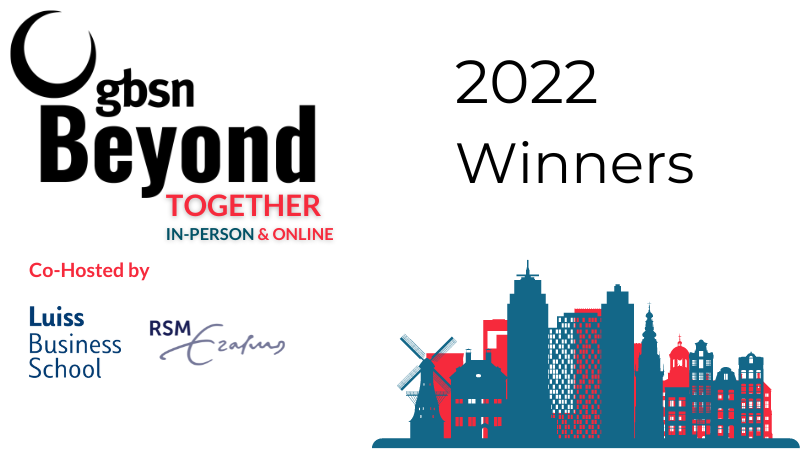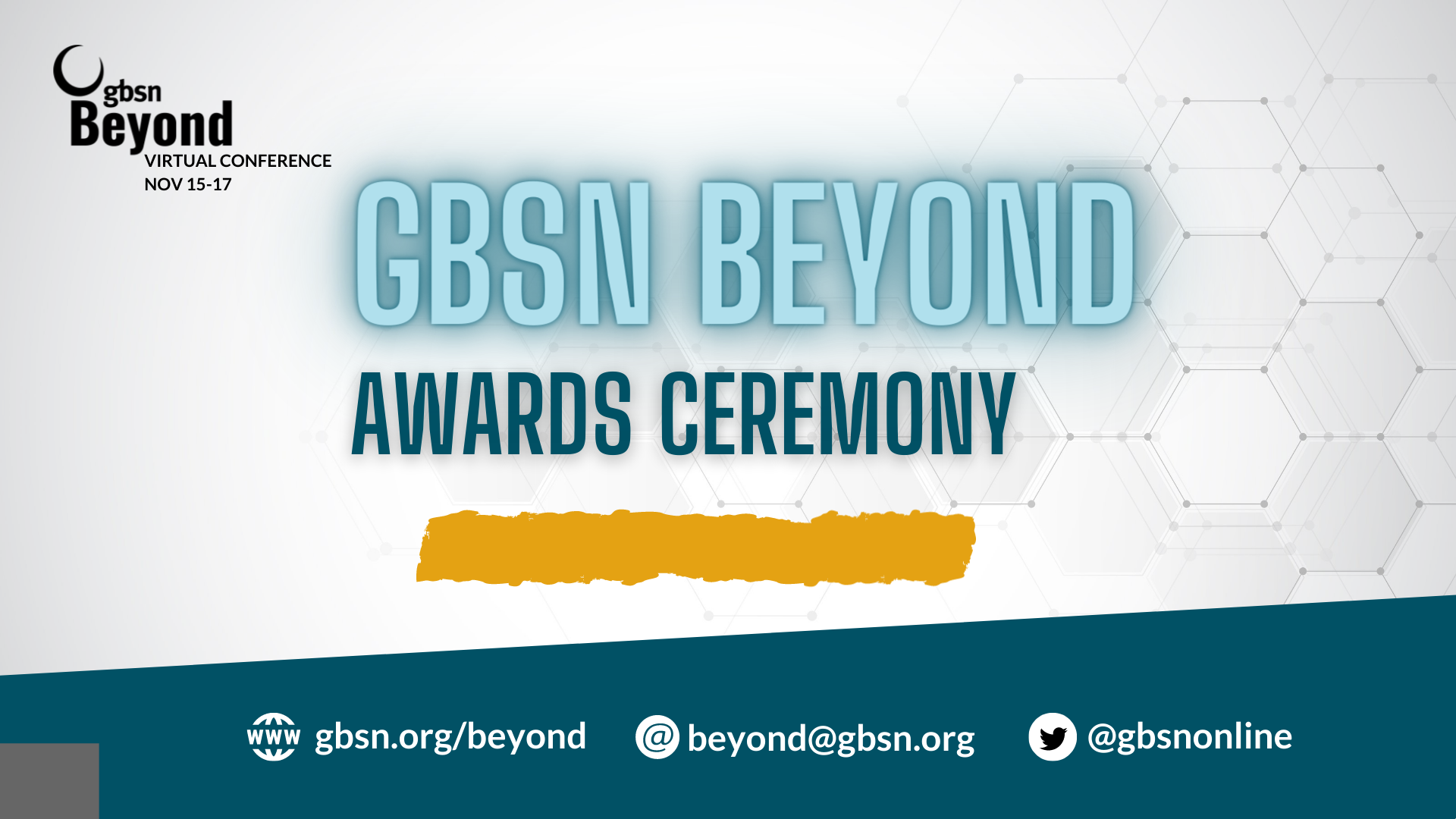GBSN was very excited to host a series of competitions for the third year in a row! These competitions challenge and recognize participants from the three stakeholder levels of GBSN’s core network: Administrators, Faculty, and Students. Be sure to check out of all the submissions in the Whova app and to congratulate fellow participants and winners for a job well done!
2022 Going BEYOND Awards
This was the second year of the GBSN and EFMD partnership for the Going BEYOND Awards, which is a joint initiative designed to celebrate institutional programs and initiatives that serve our communities worldwide. Qualifying entries were submitted by adminstrators and described programs and initiatives that have demonstrated a positive impact on society BEYOND the traditional degree programs offered by institutions and academic research published in journals. Out of 60 total submissions from 54 schools and 31 countries, the elite panel of judges determined the following as winners for the 2022 Going BEYOND Awards, they are:
FIRST Place: Edinburgh Business School, UK with their MBA Lebanese Refugee Scholarships Initiative
Edinburgh Business School at Heriot-Watt Univerity has partnered with Theirworld, a global charity committed to ending the global education crisis and unleashing the potential of the next generation, to offer fully funded Master of Business Administration (MBA) scholarships to Syrian and Palestinian refugees living in Lebanon and vulnerable Lebanese citizens. You can view their submission here.

Second Place: HEC Montreal, Canada with their SEED Network by IDEOS Program
The primary mission of the SEED network of researchers and entrepreneurship program Promoters is to mobilize research, teaching and practice for the scaling of micro-enterprises locally and internationally. You can view their submission here.

Third Place: Bauer College of Business University of Houston, USA with their SURE Program
The SURE Program, otherwise known as, Stimulating Urban Renewal through Entrepreneurship, targets people who have been historically excluded from business education and professional development activities and connects students, entrepreneurs, and Business executives to economically empower entrepreneurs from under- resourced communities and train students in practical, human-centered skills. You can view their submission here.
This year, our Top Three Winners are invited to present their programs and initiatives on Monday, November 21 at 10AM EST. Register here!

2022 Capsim Microsimulation Development Lab
One of the most time-consuming and challenging competitions that GBSN hosts is the Microsimulation Development Lab, in partnership with CapsimInbox. This was the third year for this opportunity, and the competition began with a learning workshop/badge opportunity, which welcomed 56 registrants from 13 countries. The workshop concluded with the beginning of the microsimulation development process, which takes approximately 5 weeks to complete for a 15-30 minute microsimulation. In the end, five microsimulations were completed and the judges determined the following team as the winner of the $5,000 prize:
FIRST PLACE: Remoras Technology by Hinrich Voss, University of Bristol and Divya Singhal and V Padhmanabhan of Goa Institute of Management
The microsimulation follows the VP of Human Resources of the FinTech company Remoras Technology, Bangalore. As VP of HR, the participant is responsible for setting, enforcing, and evaluating HR procedures to align with the current administration. You can take the microsimulation for free here!


2022 Social Logistics Challenge
This year marked the third year for a GBSN Beyond-related student logistics competition, but the first year for the Social Logistics Challenge. This year, students were challenged with the fundamental reminder of the definition of logistics: coordinated separate activities which combine to one organized movement of goods, services, and people. This challenge incorporated this essential philosophy of logistics into the new and innovative study of social logistics, which aims to introduce a social (human) factor in the systems and to apply logistics principles and methods in solving problems within society. Students were then asked to utilize their logistical knowledge and training to improve a societal access problem. They identified the community of this problem, the multiple stakeholders involved, and most importantly, how this solution supports one of the 17 UN Sustainable Development Goals. Out of 158 registrations (53 teams) from 47 schools and 21 countries, Preliminary Judges determined the Top Five Teams who presented LIVE to a panel of Final Round Judges, who are industry experts in humanitarian and social logistics and supply chain both in commercial and non-governmental spheres. After all of these very impressive solutions were presented, the judges determined the following first place team, who will be receiving the $5,000 prize, as well as indentified the second and third place winners. You can check out all of the Top Five Team Projects here!
FIRST PLACE: Team Green Innovators, Asian Institute of Management, Philippines
The goal of their project was to bridge access of feminine care and education to uplift the lifestyle, mental health, and hygiene of Filipina women in remote areas, initially zooming on the schoolgirls. Bridging the gap, recognizing the capabilities and potential, aspiring sustainable activities makes the Filipina First initiative aims to help improve the role of women in the society better in the long run. Team: Nikki Isabel Laynes, Suzanne Sevilla, Kirk Anthony Camus, and Guian Carlo Mascardo.
Quote from Green Innovators: “And for giving us the opportunity to share ideas. I think we’re all aligned here in that we wanted to make sure we do something – not only for making sure our ideas are out there, but also to make sure that we uplift the lives of the people, socially and in terms of social logistics. So, thank you!”


Second Place: Team WASH Advancement Centre, University of Ghana and University of Calgary
The goal of their project was solar-powered potable water systems and clean toilet facilities to be provided for rural Ghanian communities with insufficient infrastructure. Team: Eric Senoo, Linda Sampedey, and Jacob Amengor.

Third Place: Team CATH from University of Leeds, UK
The goal of this project was to solve the combined problems of food waste and homelessnes in Leeds, UK by a process similar to the “Too Good to Go” app. Team: Ayesha Shahzad, Hannah Godfrey Gonzalez, Timo Bonsels, and Craig McWilliam Cervera.

GBSN is proud of all of the teams, individuals, and schools who participated and we look forward to inviting you to more competitions in the future! If you have any questions, comments, or ideas regarding competitions, please email Maddie Handler at mhandler@gbsn.org.













 We all have sat through conferences replete with formal statements and endless powerpoint presentations, Appropriately, as it deals with Disruptive Education Models from the Developing World, ours will be a refreshing “Un-conference,” inspired by Lewis Carrroll’s “Through the Looking Glass.” You remember Alice, congratulating Humpty Dumpty for his splendid cravat. The White King and Queen gave it to me, he said, for an unbirthday present. GBSN’s conference includes an Un-Keynote, and even a Mad Hatter Networking Tea (Party) Break. We are proud to boast an innovative un-conference and a ‘not so typical’ agenda, designed to be proactive, relevant and rewarding for all conference participants. The un-conference format creates space that encourages peer-to-peer learning, collaboration and creativity.
We all have sat through conferences replete with formal statements and endless powerpoint presentations, Appropriately, as it deals with Disruptive Education Models from the Developing World, ours will be a refreshing “Un-conference,” inspired by Lewis Carrroll’s “Through the Looking Glass.” You remember Alice, congratulating Humpty Dumpty for his splendid cravat. The White King and Queen gave it to me, he said, for an unbirthday present. GBSN’s conference includes an Un-Keynote, and even a Mad Hatter Networking Tea (Party) Break. We are proud to boast an innovative un-conference and a ‘not so typical’ agenda, designed to be proactive, relevant and rewarding for all conference participants. The un-conference format creates space that encourages peer-to-peer learning, collaboration and creativity.